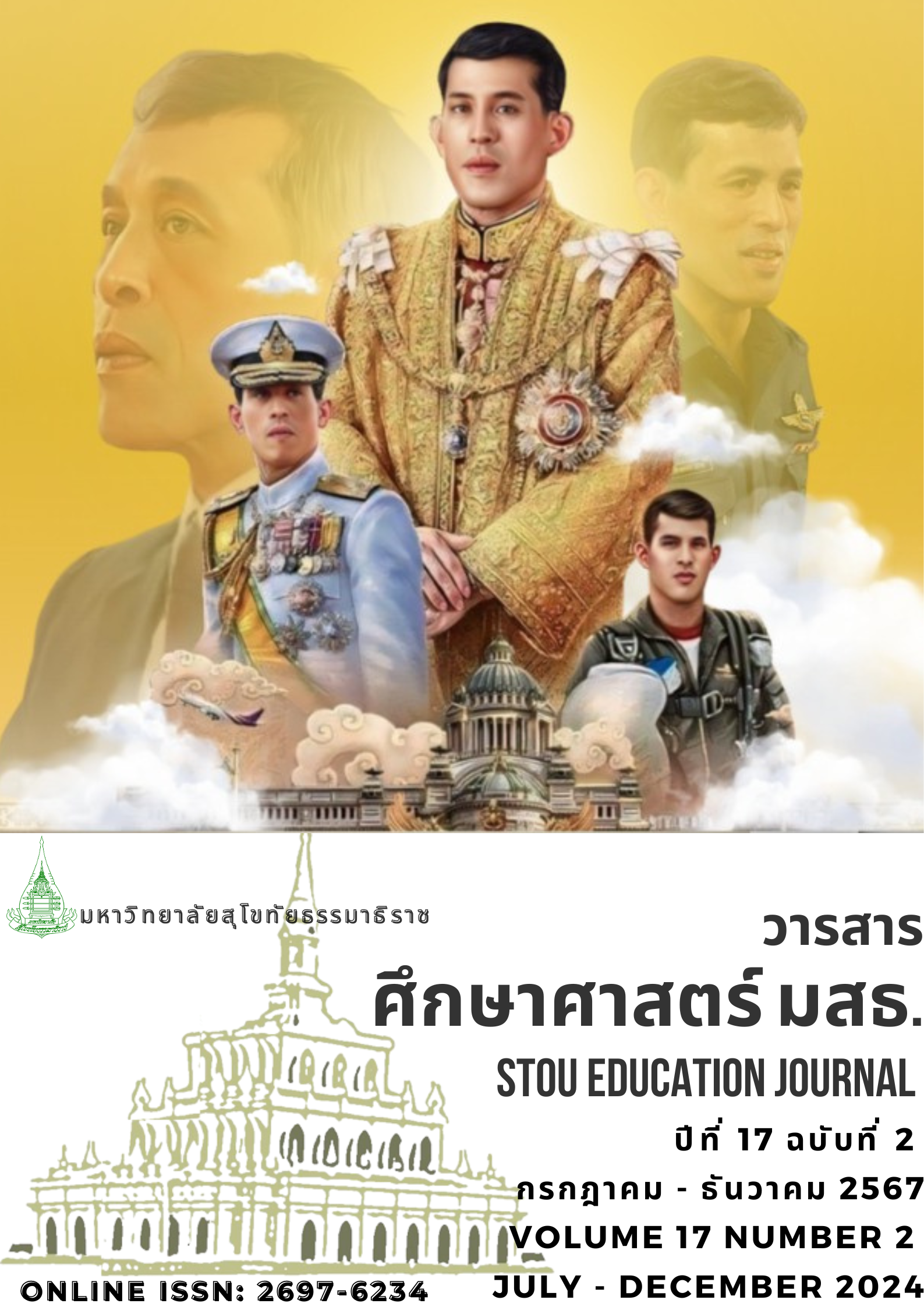The Effects of Using Guidance Activity Packages Based on the Japanese Ikigai Philosophy to Enhance Career Planning Ability of Grade 11 Students at Prachaksilapakarn School in Udon Thani Province
Main Article Content
Abstract
The objectives of this research were (1) to compare the levels of career planning ability of students in the experimental group before and after using a guidance activities package based on the Japanese Ikigai Philosophy to enhance career planning ability; and (2) to compare the career planning ability level of the experimental group students who used the guidance activities package base on the Japanese Ikigai Philosophy to enhance career planning ability and the counterpart ability level of the control group students who undertook traditional guidance activities. The research sample consisted of Grade 11 Students in two intact classrooms of Prachaksilapakarn School in Udon Thani province during the 2024 academic year obtained from cluster random sampling. The two classrooms were selected based on the comparable mean scores of career planning ability of their students as a result of career planning ability test administered to all Grade 11 classrooms in the school. Then, one classroom containing 30 students was randomly assigned to be the experimental group; the other classroom containing 30 students, the control group. The employed research instruments were (1) a scale to assess career planning ability; (2) a guidance activities package based on the Japanese Ikigai Philosophy to enhance career planning ability with 12 guidance activities; and (3) a set of traditional guidance activities. Statistics employed for data analysis were the percentage, mean, standard deviation, and t-test. Research findings showed that (1) the post-experiment career planning ability level of the experimental group students who used the guidance activities package based on the Japanese Ikigai Philosophy to enhance career planning ability was significantly higher than their pre-experiment counterpart ability level at the .01 level; and (2) the post-experiment career planning ability level of the experimental group students who used the guidance activities package based on the Japanese Ikigai Philosophy to enhance career planning ability was significantly higher than the counterpart ability level of the control group students who undertook traditional guidance activities at the .01 level.
Article Details
References
กระทรวงแรงงาน. (2566, ตุลาคม). การตัดสินใจเลือกอาชีพ. กระทรวงแรงงาน. https://shorturl.asia/Dtlcy
กฤตวรรณ คำสม. (2559). การแนะแนวเบื้องต้น. คณะครุศาสตร์ มหาวิทยาลัยราชภัฏอุดรธานี.
กฤตินี พงษ์ธนเลิศ. (2565). Discover your happiness find your ikigai: ค้นพบความสุข ตามหาความหมายด้วยอิคิไก. แคริเบอร์.
กรมการจัดหางาน. (2561). คู่มือการเตรียมความพร้อมก่อนเข้าสู่ตลาดแรงงาน การบริการแนะแนวอาชีพของ กรมการจัดหางาน. กองส่งเสริมการมีงานทำ กรมการจัดหางาน กระทรวงแรงงาน.
เคน โมงิ. (2561). อิคิไก ความหมายของการมีชีวิตอยู่ (วุฒิชัย กฤษณะประกรกิจ, ผู้แปล). (พิมพ์ครั้งที่ 3). มูฟพับลิชชิ่ง.
นิรนาท แสนสา. (2557). หน่วยที่ 7 กิจกรรมและเครื่องมือเพื่อสำรวจความสนใจในอาชีพ. ใน ประมวลสาระชุดวิชา กิจกรรมและเครื่องมือแนะแนว หน่วยที่ 1-8 (พิมพ์ครั้งที่ 2, น. 1-62). นนทบุรี: สาขาวิชาศึกษาศาสตร์มหาวิทยาลัยสุโขทัยธรรมาธิราช.
นิรนาท แสนสา. (2558). หน่วยที่ 3 การวางแผนอาชีพกับการพัฒนาคุณภาพชีวิต. ใน ประมวลสาระชุดวิชา การแนะแนวกับคุณภาพชีวิต หน่วยที่1-8 (พิมพ์ครั้งที่ 2, น. 1-71). นนทบุรี: สาขาวิชาศึกษาศาสตร์ มหาวิทยาลัยสุโขทัยธรรมาธิราช.
น้ำอ้อย สุขเสนา. (2562). Ikigai (อิคิไก) ความหมายของการมีชีวิตอยู่ครูควรรู้และนำเข้าสู่ห้องเรียน. ครุสารธนบุรี, 7(12), 8-9.
พัชรินทร์ พุตดำ. (2562). ผลการใช้ชุดกิจกรรมแนะแนวเพื่อพัฒนาความสามารถในการวางแผนอาชีพของนักเรียนชั้นมัธยมศึกษาปีที่ 5 โรงเรียนสามเสนวิทยาลัย กรุงเทพมหานคร [การค้นคว้าแบบอิสระมหาบัณฑิต ไม่ได้ ตีพิมพ์]. มหาวิทยาลัยสุโขทัยธรรมาธิราช.
วลัยนาสภ์ มีพันธุ์. (2565). การพัฒนาโปรแกรมการศึกษานอกระบบโรงเรียนเพื่อส่งเสริมความสามารถในการวางแผนอาชีพสำหรับนักเรียนมัธยมศึกษาตอนต้น [วิทยานิพนธ์ปริญญาดุษฎีบัณฑิต ไม่ได้ตีพิมพ์]. จุฬาลงกรณ์มหาวิทยาลัย.
สมร ทองดี และ ปราณี รามสูตร. (2545). หน่วยที่ 9 แนวคิดในการพัฒนากิจกรรมแนะแนว. ใน ประมวลสาระชุดวิชา การพัฒนาเครื่องมือและกิจกรรมแนะแนว หน่วยที่9-15 (น. 1-67). นนทบุรี: สาขาวิชาศึกษาศาสตร์ มหาวิทยาลัยสุโขทัยธรรมาธิราช.
สมาคมแนะแนวแห่งประเทศไทย. (2559). การแนะแนวแบบมุ่งอนาคต.โรงพิมพ์ชุมนุมสหกรณ์การเกษตรแห่งประเทศไทย จำกัด.
อมราภรณ์ เพ็ชรสุ่ม. (2561). ผลการใช้ชุดกิจกรรมแนะแนวตามแนวคิดพหุปัญญาเพื่อพัฒนาการตระหนักรู้ด้านอาชีพของนักเรียน ชั้นมัธยมศึกษาปี ที่ 3 โรงเรียนสตรีระนอง จังหวัดระนอง [วิทยานิพนธ์ปริญญามหาบัณฑิต ไม่ได้ตีพิมพ์]. มหาวิทยาลัยสุโขทัยธรรมาธิราช.
Creager, A. N. H., & Deaco, M. (2012). Trait and factor, developmental, learning, and cognitive theories. In Career counseling: Foundations, perspectives, and applications (2nd ed., pp. 44-45). Routledge.
Sone, T., Nakaya, N., Ohmori, K., Shimazu, T., Higashiguchi, M., Kakizaki, M., & Tsuji, I. (2008). Sense of life worth living (ikigai) and mortality in Japan: Ohsaki Study. Psychosomatic medicine, 70(6), 709-715.


